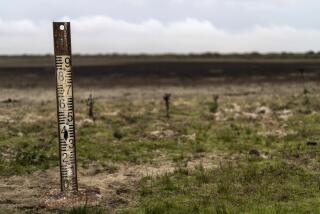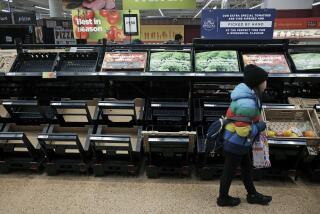Green-Thumbing Their Noses at a Seed Law
- Share via
LONDON — European gardeners who deal in the seeds of the Lazy Housewife French bean, the ballerina tomato or the Bedford Market rearguard Brussels sprout are the vegetable world’s equivalent of drug runners.
The tasty traditional varieties are among hundreds of types of fruits and vegetables that fall afoul of a European Union law that decrees that only seeds on an official register may be legally marketed.
British organic farmers, gardeners, gourmet chefs and food writers have united in their condemnation of the law, which they say has led to the disappearance of almost 2,000 vegetable varieties in Europe since it was passed in 1964.
The issue is a poignant one in Britain, a nation of gardening fanatics with a deep suspicion of decrees emanating from EU bureaucrats in Brussels, Belgium.
The British lobbyists say that not only is biodiversity threatened, but consumers miss out on tastes and textures not available in the average supermarket.
“Our supermarkets are full of exotic vegetables which have traveled thousands of miles and waste fuel resources, and all the while our heritage is going to waste,” said Jo Bruton of the British-based Henry Doubleday Research Assn. (HDRA), campaigning to save native species.
*
But Britain’s seed police, the Ministry of Agriculture, Fisheries and Food (MAFF), said the list was essential to ensure standardization and quality control.
“To get on the list, varieties have to be shown to be distinct, uniform and capable of repeating itself,” said Kathy Fox, responsible for registering varieties for MAFF.
Fox said she would expect organic farmers to want the same quality end product as a normal farmer and that the list was there to protect consumers.
Fox said plant health and seed inspectors visit seed merchants to make sure they are not selling illegal seeds.
Activists say seed traders must pay hundreds of pounds (dollars) to register each variety and only best-selling seeds can cover registration costs.
“The conservation of threatened vegetable varieties may be less glamorous, but it is every bit as important as that of tropical rain forests,” the HDRA said in a fund-raising leaflet, offering the opportunity to adopt a vegetable.
Eager environmentalist Prince Charles is patron of the HDRA and adoptive father of the rat’s tail radish.
*
Gardeners wanting to continue to grow species not on the list can borrow them from the Heritage Seed Library run by the HDRA, which lends the seeds of more than 700 species.
Gardeners borrow the prohibited seeds, plant them and return replacement seeds from their own crop to the library. They are also taught how to gather seeds so they can be passed on, but not sold, to friends and neighbors.
HDRA’s Bruton said the Irish potato famine of 1845, when sudden crop failure caused widespread starvation and tens of thousands of people to emigrate, showed what could happen when people relied on too few species.
“Genetic diversity is being lost, and we may not be able to cope with diseases and blight.”
In Channel Four television’s program “Food File,” gourmet chefs took part in the “Great Vegetable Plot” to highlight the number and range of native British vegetables not on the official list.
“Commercial vegetable growers want varieties which give safe yields and uniformity and are pest resistant. But we [food writers] are keen to promote produce that’s in season, which we can grow ourselves,” food writer Lindsey Bareham said. “The old varieties have so much flavor.”
Bareham said gourmet chefs and food writers were spearheading a return to British-grown vegetables.
The Royal Botanic Gardens at Kew in London has also launched a seed conservation project that aims to collect the seeds of one in 10 of the world’s species by 2010. Around one-tenth of the world’s 250,000 flowering plants are threatened.
The seeds of the entire British flora, around 1,400 species, will be collected, dried and frozen and the project will then concentrate on plants vital to arid lands, threatened by rapid desertification.
Roger Smith, Kew’s head of seed conservation, criticized developed countries for relying on so few species and failing to protect biodiversity.
Smith said people in developed countries relied on only about 60 species for most of their needs, while inhabitants of the tropical dry lands put 6,000 species to use for anything from medicine and food to manure and natural toothbrushes.
“We’re putting all our eggs in one basket,” Smith said. “Humans have adapted the environment to meet their own needs, but will they have the flexibility to adapt themselves if the environment changes?”
More to Read
Sign up for Essential California
The most important California stories and recommendations in your inbox every morning.
You may occasionally receive promotional content from the Los Angeles Times.













